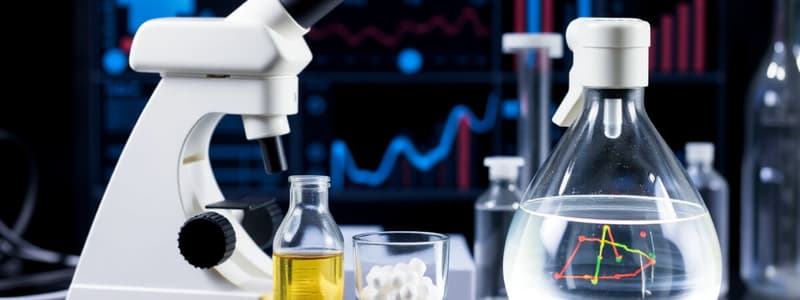Podcast
Questions and Answers
What does it indicate if measurement data of boiling temperatures varies significantly?
What does it indicate if measurement data of boiling temperatures varies significantly?
- There may have been an error in the experiment. (correct)
- The experiment was successful.
- The boiling point is consistent.
- The data fits well.
When interpreting data, what does the term 'interpret' mean in this context?
When interpreting data, what does the term 'interpret' mean in this context?
- To replicate the data multiple times.
- To formulate a hypothesis based on the data.
- To collect data from various sources.
- To explain what the data indicates. (correct)
What is a likely finding when comparing the boiling point of salt water and fresh water?
What is a likely finding when comparing the boiling point of salt water and fresh water?
- Fresh water has a higher boiling point.
- Neither shows any consistent boiling point.
- Salt water has a higher boiling point. (correct)
- Both have the same boiling point.
Why is it crucial for data to fit well in scientific experiments?
Why is it crucial for data to fit well in scientific experiments?
How can one visually present the interpretation of data regarding boiling points?
How can one visually present the interpretation of data regarding boiling points?
What type of data is considered scientific evidence in an experiment?
What type of data is considered scientific evidence in an experiment?
In the proposed experiment about boiling points, which hypothesis was tested?
In the proposed experiment about boiling points, which hypothesis was tested?
What was the boiling point of fresh water observed during the experiment?
What was the boiling point of fresh water observed during the experiment?
What conclusion can be drawn if salt water boils at a higher temperature than fresh water?
What conclusion can be drawn if salt water boils at a higher temperature than fresh water?
How can one confirm the accuracy of the collected data in the boiling point experiment?
How can one confirm the accuracy of the collected data in the boiling point experiment?
Flashcards
Scientific evidence
Scientific evidence
Data collected during a science experiment. It includes all measurements, observations, and information gathered to answer a question.
Hypothesis
Hypothesis
A prediction about the outcome of an experiment, based on prior knowledge or observations.
Data analysis
Data analysis
The process of comparing scientific evidence (data) to a hypothesis to see if they agree.
Data fits
Data fits
Signup and view all the flashcards
Accurate Data
Accurate Data
Signup and view all the flashcards
Replicability
Replicability
Signup and view all the flashcards
Interpreting Data
Interpreting Data
Signup and view all the flashcards
Experiment
Experiment
Signup and view all the flashcards
Study Notes
Evaluating Scientific Evidence
- Scientific evidence is data collected during an experiment.
- Data analysis determines if evidence supports the hypothesis or answers the question.
Example: Boiling Point Experiment
- Question: Which boils faster, salt water or fresh water?
- Hypothesis: Salt water has a higher boiling point than fresh water.
- Data: Temperature readings during heating of both types of water.
- Expected outcome: Salt water's boiling point should be higher than fresh water's, based on the hypothesis.
Data Analysis and Interpretation
- Data fitting the hypothesis: Verify that collected data aligns with the predicted outcome.
- Example: Fresh water boils at 212°F, salt water at 216°F. This data supports the hypothesis.
- Replicability: Consistent results are crucial; if the measurements vary significantly, there may be errors needing investigation.
Interpretation Steps
- Identifying the outcome: Determine if collected data agrees with the hypothesis or answers the question.
- Interpreting results: The data demonstrates salt water boils at a higher temperature than fresh water.
- Presentation: Summarizing the interpretation, e.g., displaying boiling points next to diagrams of the water.
Studying That Suits You
Use AI to generate personalized quizzes and flashcards to suit your learning preferences.
Description
Test your understanding of how to evaluate scientific evidence through experiments and data analysis. This quiz explores examples like the boiling point experiment, and emphasizes the importance of replicability and data interpretation in scientific research.




